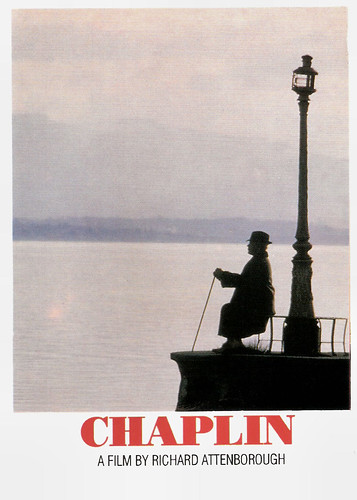
French postcard by Editions Mercuri, no. 813. Photo: Tri-Star Pictures. Publicity still for Chaplin (Richard Attenborough, 1992).
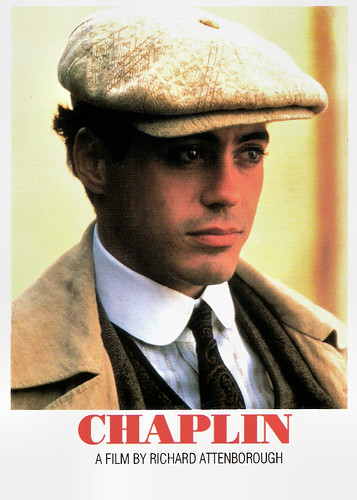
French postcard by Editions Mercuri, no. 814. Photo: Tri-Star Pictures. Publicity still for Chaplin (Richard Attenborough, 1992).
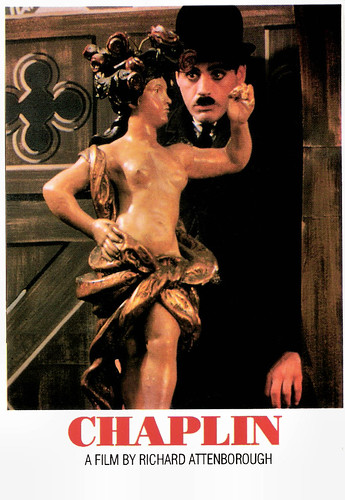
French postcard by Editions Mercuri, no. 815. Photo: Tri-Star Pictures. Publicity still for Chaplin (Richard Attenborough, 1992).
Haunted by a sense of loss
Chaplin (Richard Attenborough, 1992) is the biography of British comedian Charlie Chaplin, filmmaker extraordinaire.
It was produced and directed by Richard Attenborough and stars Robert Downey, Jr., Paul Rhys as Charlie's brother Sydney Chaplin, John Thaw as the British music-hall impresario Fred Karno, Marisa Tomei as film star Mabel Normand, and Penelope Ann Miller as Chaplin's frequent co-star Edna Purviance.
It also features Chaplin's real-life daughter, Geraldine Chaplin in the role of her own paternal grandmother, the mentally ill Hannah Chaplin.
The film was adapted by William Boyd, Bryan Forbes and William Goldman from the books My Autobiography by Chaplin and Chaplin: His Life and Art by film critic David Robinson.
The film is structured around lengthy flashbacks as the elderly Charlie Chaplin, now living in Switzerland, recollects moments from his life during a conversation with the editor of his autobiography (played by Anthony Hopkins).
Chaplin's recollections begin with his childhood of extreme poverty, from which he escapes by immersing himself in the world of the London music halls, after which he relocates to the United States.
While his screen characters were extremely hilarious, Chaplin shows that the man behind 'The Little Tramp' was constantly haunted by a sense of loss.
Highlighted works such as The Gold Rush (1925) and The Great Dictator (1940) illustrate significant turning points in Chaplin's prolific filmography.
There are references to his many romantic episodes, his professional collaboration with early Hollywood film producer Mack Sennett (Dan Aykroyd) and friendship with Douglas Fairbanks (Kevin Kline), and to J. Edgar Hoover (Kevin Dunn) whose US Federal Bureau of Investigation accused Chaplin of communist sympathies and forced him to leave the USA.
The film ends with Chaplin returning to the United States to accept an Honorary Award at the 1972 Academy Awards ceremony.
Richard Attenborough's director's cut was 147 minutes, 12 minutes longer than the version shown in cinemas. Attenborough later said that the cuts damaged the film.
Michael DeZeburia at IMDb: "Robert Downey Jr., first of all, portrays Chaplin with amazing accuracy. Some parts of this performance are particularly memorable, such as his invention of the famous tramp's walk just after having feverishly picked out the outfit, the astonishingly accurate depiction of Charlie as an old man, and of course, the many parts of the film that involve parts of his life where he was working on his own films."
Lisa Kropiewnicki at AllMovie: "The film is a thoughtful mixture of melancholy and humor, juxtaposing Chaplin's private loneliness and loss with his professional comedic talents and fortitude. Spanning a period of nearly 80 years in the actor's life, the film has been criticized for trying to cover too much narrative ground, but given the enormity of Chaplin's contribution to his art and the personal obstacles he overcame, this is an enjoyable, emotional, and authentic film."
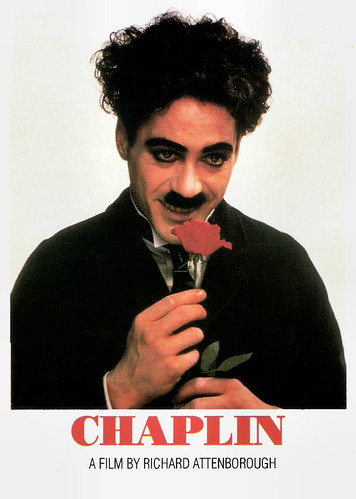
French postcard by Editions Mercuri, no. 816. Photo: Tri-Star Pictures. Publicity still for Chaplin (Richard Attenborough, 1992).
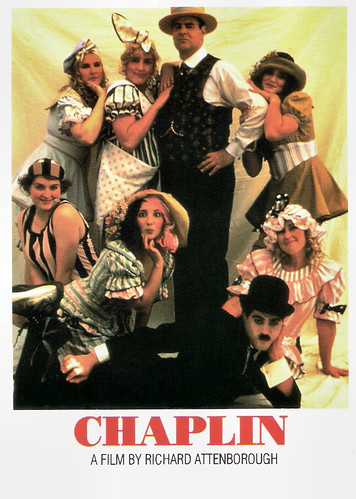
French postcard by Editions Mercuri, no. 817. Photo: Tri-Star Pictures. Publicity still for Chaplin (Richard Attenborough, 1992) with Dan Aykroyd as Mack Sennett and Robert Downey Jr. as Charlie Chaplin, between Sennett's Bathing Beauties.
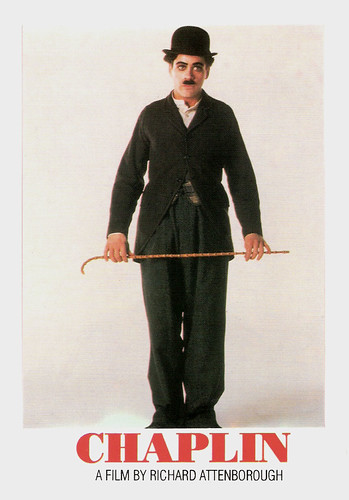
French postcard by Editions Mercuri, no. 819. Photo: Tri-Star Pictures. Publicity still for Chaplin (Richard Attenborough, 1992).
Sources: Lisa Kropiewnicki (AllMovie), Wikipedia and IMDb.
No comments:
Post a Comment